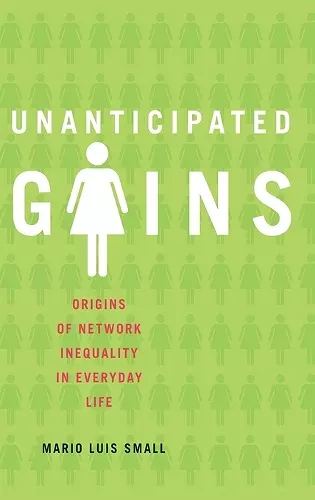Unanticipated Gains
Origins of Network Inequality in Everyday Life
Format:Hardback
Publisher:Oxford University Press Inc
Published:16th Jul '09
Currently unavailable, and unfortunately no date known when it will be back
This hardback is available in another edition too:
- Paperback£28.49(9780199764099)

Social capital theorists have shown that inequality arises in part because some people enjoy larger, more supportive or otherwise more useful networks. But why do some people have better networks than others? Unanticipated Gains argues that the answer lies less in people's deliberate "networking" than in the institutional conditions of the colleges, firms, gyms, and other organizations in which they happen to participate routinely. The book introduces a model of social inequality that takes seriously the embeddedness of networks in formal organizations, proposing that what people gain from their connections depends on where those connections are formed and sustained. It studies an unlikely case: the experiences of mothers whose children were enrolled in New York City childcare centers. As a result of the routine practices and institutional conditions of the centers--from the structure of their parents' associations, to apparently innocuous rules such as pick-up and drop-off times---many of these mothers dramatically increased their social capital and measurably improved their wellbeing. Yet how much they gained depended on how their centers were organized. The daycare centers also brokered connections to other people and organizations, affecting not only the size of mothers' networks but also the resources available through them. Social inequality then arises not merely out of differences in skills or deliberate investments - as the conventional social scientific and political wisdom would have it - but also out of the differences in the routine organizations in which people belong. In addition to childcare centers, Small also identifies the social forces at work in many other organizations, including beauty salons, bath houses, gyms, and churches.
Child care centers are not just about caring for children. Rather, under the right circumstances, they also foster invaluable community ties among moms. That was a crucial fact about the first kindergartens a century ago, and it is the central lesson of Mario Small's important new book. Unanticipated Gains has important implications for anyone concerned about how to reweave the fabric of American communities. * Robert Putnam, author of Bowling Alone *
In this supreme work, Mario Luis Small does nothing less than transform the way that we understand social capital. With meticulous ethnographic fieldwork and a large body of data, he argues that social capital should no longer be conceptualized as individual action divorced from organizational context. To say that this multi-method case study is necessary reading alongside Coleman, Bourdieu, and Wilson is an understatement. Unanticipated Gains provides enormous leverage in explaining social inequality. Small provides a bold new agenda for sociology. * Mitchell Duneier, Professor of Sociology, Princeton University *
Unanticipated Gains is a major contribution to the growing literature on social capital. Mario Small's original model of how social capital is influenced by organizational conditions is brilliantly applied to a case study of the experiences of mothers whose children were enrolled in child-care centers in New York. In the process he uncovered mechanisms that produce and perpetuate inequality in personal networks, and thereby provides direction for future research. Indeed, his notion of the 'organizational isolate' will become a key concept in future studies of formal organizations. * William Julius Wilson, University Professor and Director of Joblessness and Urban Poverty Research Program, Harvard University *
In Unanticipated Gains, Small suggests an entirely new way to think about our social relationships, situating them within the organizations that we work for, join, and patronize. Small keenly uncovers how these organizations set the parameters of our social worlds, and with an impressive variety of data, he shows that differences in organizations' brokering power is an overlooked source of inequality. This is a supremely smart book that makes it impossible to go back to the old ways of studying individuals outside of the groups within which they live their lives. * Mary Pattillo, Professor of Sociology and African-American Studies, Northwestern University *
In his compelling new book, Unanticipated Gains, Mario Small joins sociological theory with detailed empirical evidence to show us how childcare centers generate much-needed social capital in low-income communities. I'll never enter a childcare center again without thinking about this book! * Sara McLanahan, Professor of Sociology and Public Affairs, Princeton University *
- Winner of 2009 C. Wright Mills Award.
ISBN: 9780195384352
Dimensions: 155mm x 236mm x 33mm
Weight: 635g
312 pages